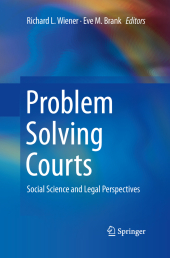 Neuerscheinungen 2015Stand: 2020-02-01 |
Schnellsuche
ISBN/Stichwort/Autor
|
Herderstraße 10
10625 Berlin
Tel.: 030 315 714 16
Fax 030 315 714 14
info@buchspektrum.de |

Eve M. Brank, Richard L. Wiener
(Beteiligte)
Problem Solving Courts
Social Science and Legal Perspectives
Herausgegeben von Wiener, Richard L.; Brank, Eve M.
Softcover reprint of the original 1st ed. 2013. 2015. xii, 256 S. 235 mm
Verlag/Jahr: SPRINGER, BERLIN; SPRINGER NEW YORK; SPRINGER 2015
ISBN: 1-489-99987-6 (1489999876)
Neue ISBN: 978-1-489-99987-0 (9781489999870)
Preis und Lieferzeit: Bitte klicken
In order to make the criminal court system more effective there has been a growing trend to have courts participate in what is essentially a rehabilitation strategy. Such courts are often referred to as "problem-solving" because they are working on root causes of criminal behavior as part of the dispensation of justice. This major shift in the role of the courts means that the court works closely with prosecutors, public defenders, probation officers, social workers, and other justice system partners to develop a strategy that pressures offenders to complete a treatment program which will ultimately, hopefully prevent recidivism. Research has shown that this kind of strategy has a two-fold benefit. It has been successful in helping offenders turn their lives around which leads to improved public safety and the ultimate saving of public funds. This book is the first to focus exclusively on problem solving courts, and as such it presents an overview of the rationale and scientific evidence for such courts as well as individual sections on the key areas in which these courts are active. Thus there is specific attention paid to domestic violence, juvenile criminality, mental health, and more. Throughout, research findings are incorporated into general discussions of these courts operate and ideally what they are trying to accomplish. There is also discussion of how such courts should evolve in the future and the directions that further research should take.
Social Psychology and Problem Solving Courts: Judicial Roles and Decision Making.- The Marriage of Science and the Law in Child Welfare Cases.- Exploring the Value-Added of Specialized Problem-Solving Courts for Dependency Cases.- Dependency Courts and Science.- Unified Family Courts: An Interdisciplinary Framework and A Problem-Solving Approach.- Domestic Violence Courts: The Case of Lady Justice Meets the Serpents of the Caduceus.- Gender Issues in Problem-Solving Courts.- Mental Health Courts May Work, But Does it Matter if they do?.- The Past, Present, and Future of Mental Health Courts.- Mental Health Courts: Competence, Responsibility, and Proportionality.- The evolution of problem-solving courts in Australia and New Zealand: A Trans-Tasman comparative perspective.- The Intended and Unintended Consequences of Problem Solving Courts.
"The good news for readers of Problem Solving Courts is that the various chapters are well written without the abrupt changes in style sometimes experienced in edited volumes. Whether for an upper level undergraduate or a graduate student with an interest in psychology and the law or for professionals in the field, a clear picture of the rationales for problem solving courts and of generic implications for practice-psychological, social, legal-is provided."
Richard W. Bloom
PsycCRITIQUES
December 18, 2013, Vol. 58, No. 49, Article 4


